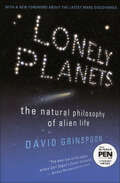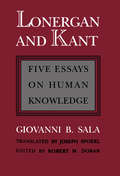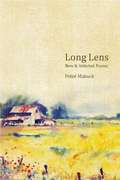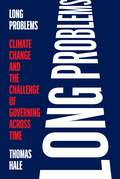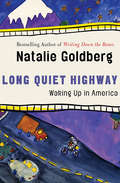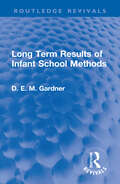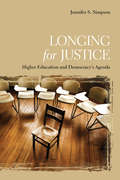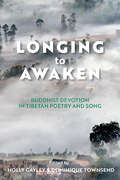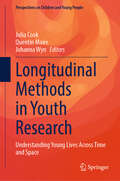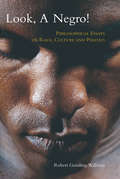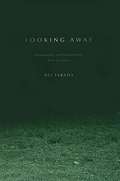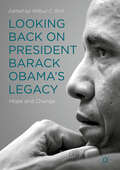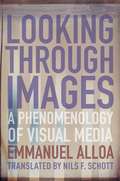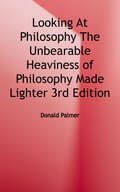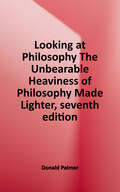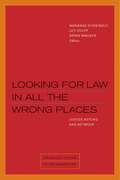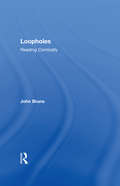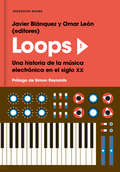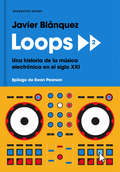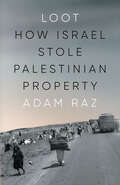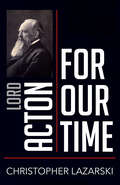- Table View
- List View
Lonely Planets: The Natural Philosophy of Alien Life
by David GrinspoonPEN Literary Award Winner: &“The best, most entertaining examination of the possibility of other life in the universe since [Carl] Sagan&’s best work.&” —Boulder Daily Camera It&’s been decades since Carl Sagan first addressed the general public about the possibility of extraterrestrial life from a scientist&’s perspective. We&’ve learned a lot in those years, and now planetary scientist David Grinspoon investigates the big questions: How widespread are life and intelligence in the cosmos? Is life on Earth an accident, or in some sense the &“purpose&” of this universe? And how can we, working from the Earth-centric definition of &“life,&” even begin to think about the varieties of life-forms on other planets? In accessible, lively prose, and using the topic of extraterrestrial life as a mirror with which to view human beliefs, evolution, history, and aspirations, Grinspoon takes us on a three-part journey—the history of our expanding awareness of other planets and our ideas on alien life dating back to the earliest days of astronomy; the science of cosmic evolution and the evolution of life on Earth, including a critique of the &“Rare Earth hypothesis&”; and the beliefs that humans hold, addressing the limits of our ability to conceptualize or communicate with intelligent aliens and the scientific and philosophical implications of far-future evolutionary possibilities. Rich in personal and often amusing anecdotes, Lonely Planets explores the shifting boundary between planetary science and natural philosophy, and reveals how the search for extraterrestrial life unites our spiritual and scientific quests for connection with the cosmos. Includes a new foreword about recent Mars discoveries &“An outstanding introduction to cosmic evolution.&” —San Jose Mercury News &“[A] terrific book.&” —San Diego Union-Tribune &“A personable chat on life, the universe and everything.&” —Publishers Weekly
Lonergan and Kant
by Giovanni B. SalaLonergan's Insight has frequently been compared with Kant's Critique of Pure Reason. Giovanni B. Sala, an internationally acknowledged Kant scholar, contrasts the cognitional theory of his former teacher Lonergan with the positions of Kant that have proved so influential, and in many ways so intractable, over the past two centuries.The first essay is one of the most influential papers ever written on Lonergan; it and the second one inquire into the notion of the a priori. The third essay presents a detailed analysis of Kantian intuitionism and contrasts it with the `knowledge as structure' position of Lonergan's critical realism. In this essay intuitionism is generalized, to allow Sala to address representatives of neoscholasticism as well. The argument with neoscholasticism continues in the fourth essay. The final paper discusses Kant's resolution of the question regarding the agreement of a priori concepts with things, and finds in Lonergan's work an alternative position on correspondence and truth. Each essay is a model of careful and thorough scholarship, and also - surprising in a book of such proportions - of clarity. Lonergan appeals several times in Insight to the device of `Clarification by Contrast.' Sala's essays show us in intricate detail how illuminating such comparisons can be.
Lonergan in the World
by James MarshIn his philosophical classic Insight, Catholic philosopher and theologian Bernard Lonergan introduced the concept of self-appropriation - the personal search for knowledge of the self, and through that of the world - as the basis for systematic philosophical investigation.In Lonergan in the World, James L. Marsh argues, clearly and passionately, that self-appropriation can serve as the basis for philosophical, ethical, and even political and economic thought. Comparing and applying Lonergan's principles to major trends in contemporary philosophy, including phenomenology, hermeneutics, postmodernism, analytic philosophy, and Marxism, Marsh uncovers the philosophical and the socio-political implications of Lonergan's work and its value as the basis for a search for justice and self-understanding.Drawing on Marsh's more than forty years of studying and teaching Lonergan's thought, Lonergan in the World is a book that should be read not just by philosophers and theologians, but by anyone interested in the philosophical foundations of a just and authentic life.
Lonergan on Philosophic Pluralism
by Gerard WalmsleyIn his influential philosophical work Insight, Bernard Lonergan made the intriguing and problematic claim that "the polymorphism of consciousness is the one and only key to philosophy." In Lonergan on Philosophical Pluralism, Gerard Walmsley examines Lonergan's many discussions of the different forms of human consciousness, as well as his sustained responses to the problems raised by philosophical and cultural pluralism. Looking closely at Lonergan's thoughts on patterns of experience, different levels of consciousness, and the differentiations of consciousness that occur through the historical development of individual human minds, Walmsley shows how polymorphic consciousness allows individuals to understand a range of philosophical positions. By understanding this range, an individual is able to sympathetically and critically appreciate different positions. Testing the strength of Lonergan's position, he directly engages postmodern thought and comparative philosophy to demonstrate that Lonergan's account of polymorphic consciousness provides a better basis for a positive evaluation of difference than does the work of many postmodern thinkers. An ambitious and soundly argued work, Lonergan on Philosophical Pluralism is both an illuminating study of Lonergan's thought, and an intriguing proposal for how difference and pluralism can be understood.
Long Lens
by Peter Makuck"Peter Makuck sees through the detritus of daily life to what matters. . . . It's that essence that lives deep down in things, looked for in people, sea- and landscapes, and creatures, that lifts the quotidian toward the marvelous, and animates this selection of poems from four decades."--Brendan GalvinFrom "Long Lens":Folding laundry, I can see our clotheslinewaving its patches of color like the flagof a foreign country where I had happily livedin a small clapboard house surrounded by pines.I can hear my mother in her strong accentsaying she didn't want a dryereven when we could finally afford one--Our sheets won't smell of trees and sunlight anymore.Long Lens represents forty years of Peter Makuck's work, including twenty-five new poems. With precise language, Makuck's imagery evokes spiritual longing, love, loss, violence, and transcendence. His subjects include the aftermath of the 1970 killings at Kent State University; scuba diving on an offshore shipwreck; flying through a storm in a small plane; rescuing a boy caught in a riptide; and lucid observations of spinner sharks, a gray fox, a spider, and a pelican tangled in a fishing line.Peter Makuck taught at East Carolina University from 1976 to 2006, where he founded Tar River Poetry. He was 2008 Lee Smith Chair in Creative Writing at North Carolina State University. Winner of the Brockman Award and the Charity Randall Citation, he lives on Bogue Banks, one of North Carolina's barrier islands.
Long Lens: New and Selected Poems (American Poets Continuum)
by Peter Makuck"Peter Makuck sees through the detritus of daily life to what matters. . . . It’s that essence that lives deep down in things, looked for in people, sea- and landscapes, and creatures, that lifts the quotidian toward the marvelous, and animates this selection of poems from four decades."—Brendan GalvinFrom "Long Lens":Folding laundry, I can see our clotheslinewaving its patches of color like the flagof a foreign country where I had happily livedin a small clapboard house surrounded by pines.I can hear my mother in her strong accentsaying she didn’t want a dryereven when we could finally afford one—Our sheets won’t smell of trees and sunlight anymore.Long Lens represents forty years of Peter Makuck’s work, including twenty-five new poems. With precise language, Makuck’s imagery evokes spiritual longing, love, loss, violence, and transcendence. His subjects include the aftermath of the 1970 killings at Kent State University; scuba diving on an offshore shipwreck; flying through a storm in a small plane; rescuing a boy caught in a riptide; and lucid observations of spinner sharks, a gray fox, a spider, and a pelican tangled in a fishing line.Peter Makuck taught at East Carolina University from 1976 to 2006, where he founded Tar River Poetry. He was 2008 Lee Smith Chair in Creative Writing at North Carolina State University. Winner of the Brockman Award and the Charity Randall Citation, he lives on Bogue Banks, one of North Carolina’s barrier islands.
Long Problems: Climate Change and the Challenge of Governing across Time
by Thomas HalePolitical strategies for tackling climate change and other &“long problems&” that span generationsClimate change and its consequences unfold over many generations. Past emissions affect our climate today, just as our actions shape the climate of tomorrow, while the effects of global warming will last thousands of years. Yet the priorities of the present dominate our climate policy and the politics surrounding it. Even the social science that attempts to frame the problem does not theorize time effectively. In this pathbreaking book, Thomas Hale examines the politics of climate change and other &“long problems.&” He shows why we find it hard to act before a problem&’s effects are felt, why our future interests carry little weight in current debates, and why our institutions struggle to balance durability and adaptability. With long-term goals in mind, he outlines strategies for tilting the politics and policies of climate change toward better outcomes.Globalization &“widened&” political problems across national boundaries and changed our understanding of politics and governance. Hale argues that we must make a similar shift to understand the &“lengthening&” of problems across time. He describes tools and strategies that can, under certain conditions, allow policymakers to anticipate future needs and risks, make interventions that get ahead of problems, shift time horizons, adapt to changing circumstances, and set forward-looking goals that endure. As the climate changes, politics must, too. Efforts to solve long-term problems—not only climate change but other issues as well, including technology governance and demographic shifts—can also be a catalyst for a broader institutional transformation oriented toward the long term. With Long Problems, Hale offers an essential guide to governing across time.
Long Quiet Highway: Waking Up in America
by Natalie GoldbergThe author of Writing Down the Bones shares her story of self-discovery through Zen Buddhism, in &“beautiful and simple prose&” (Library Journal). In this autobiographical work, Natalie Goldberg takes us on a journey from her suburban childhood to her maturation as a writer. From the high-school classroom where she first listened to the rain, to her fifteen years as a student of Zen Buddhism, Natalie Goldberg&’s path is by turns illuminating, disciplined, heartbreaking, hilarious, and healing. Along the way she reflects on her life and work in prose that is both elegant and precise, reminding the reader of what it means to be fully alive. This ebook features an illustrated biography of Natalie Goldberg, including rare photos and never-before-seen documents from the author&’s personal collection.
Long Term Results of Infant School Methods (Routledge Revivals)
by D.E.M. GardnerFirst published in 1950, Long Term Results of Infant School Methods was written to explain and summarise the results of Gardner’s experiment to test the extent to which the effect of different styles of Infant school education, "experimental" or "control", would also be apparent at a later stage. The book details how the tests and the schools involved were chosen; the different types of tests conducted and their respective aims; and a summary of Gardner’s conclusions. It will appeal to those with an interest in the history and theory of education.
Long Wars and the Constitution
by Stephen M. GriffinIn a wide-ranging constitutional history of presidential war decisions from 1945 to the present, Stephen M. Griffin rethinks the long-running debate over the imperial presidency and concludes that the eighteenth-century Constitution is inadequate to the challenges of a post-9/11 world. The Constitution requires the consent of Congress before the United States can go to war. Truman’s decision to fight in Korea without gaining that consent was unconstitutional, says Griffin, but the acquiescence of Congress and the American people created a precedent for presidents to claim autonomy in this arena ever since. The unthinking extension of presidential leadership in foreign affairs to a point where presidents unilaterally decide when to go to war, Griffin argues, has destabilized our constitutional order and deranged our foreign policy. Long Wars and the Constitution demonstrates the unexpected connections between presidential war power and the constitutional crises that have plagued American politics. Contemporary presidents are caught in a dilemma. On the one hand are the responsibilities handed over to them by a dangerous world, and on the other is an incapacity for sound decisionmaking in the absence of interbranch deliberation. President Obama’s continuation of many Bush administration policies in the long war against terrorism is only the latest in a chain of difficulties resulting from the imbalances introduced by the post-1945 constitutional order. Griffin argues for beginning a cycle of accountability in which Congress would play a meaningful role in decisions for war, while recognizing the realities of twenty-first century diplomacy.
Longing for Justice
by Jennifer S. SimpsonA timely and persuasive argument for Higher Education's obligations to our democratic society, Longing for Justice combines personal narrative with critical analysis to make the case for educational practices that connect to questions of democracy, justice, and the common good. Jennifer S. Simpson begins with three questions. First, what is the nature of the social contract that universities have with public life? Second, how might this social contract shape undergraduate education? And third, how do specific approaches to knowledge and undergraduate education inform how students understand society?In a bold challenge to conventional wisdom about Higher Education, Simpson argues that today's neoliberal educational norms foreground abstract concepts and leave the complications of real life, especially the intricacies of power, unexamined. Analysing modern teaching techniques, including service learning and civic engagement, Simpson concludes that for Higher Education to serve democracy it must strengthen students' abilities to critically analyse social issues, recognize and challenge social inequities, and pursue justice.
Longing to Awaken: Buddhist Devotion in Tibetan Poetry and Song (Traditions and Transformations in Tibetan Buddhism)
by Holly Gayley Dominique TownsendAn indispensable collection of Buddhist devotional poems and songsLonging to Awaken features twenty-five translations of Buddhist devotional poems and songs composed by revered Tibetan masters from diverse traditions and time periods. The anthology invites readers to experience a variety of poetic forms that embody a range of emotions, from grief and longing to skepticism and humor, demonstrating the ways that poetry can inspire faith as well as reflect the profundity and at times fraught nature of the teacher-student relationship. This collection gives weight to literary—not simply literal—translation as a crucial endeavor in the transmission of Buddhism today, one with the potential to raise the profile of Tibetan poetry onto the stage of global literature. Featuring a remarkable interview with esteemed Tibetan master Jetsün Khandro Rinpoché to elucidate Buddhist devotion and a landmark essay by Lama Jabb articulating a Tibetan theory for translating poetry.
Longitudinal Methods in Youth Research: Understanding Young Lives Across Time and Space (Perspectives on Children and Young People #15)
by Johanna Wyn Julia Cook Quentin MaireThis book addresses how longitudinal research approaches are used to understand young people’s lives. It elucidates how youth researchers use longitudinal approaches, and how longitudinal research can help us to both understand and shape the field of youth sociology. Chapters discuss the creation of knowledge about youth and how longitudinal research shapes the field of youth sociology and shed light on key tensions and emerging debates in longitudinal youth research ranging from research design to data collection, analysis, and use. It considers longitudinal studies using a broad range of methods, including qualitative, quantitative, mixed methods, retrospective methods, and creative and participatory methods. This collection offers insights from longitudinal youth scholars conducting research in Argentina, Lithuania, Australia, Estonia, Canada, the United States (US), the United Kingdom (UK), Finland and India. These researchers reflect on the future of longitudinal youth research, addressing emerging and prospective issues. This book provides a concise survey of key established and emerging areas of concern in longitudinal research and of the relationship between these areas and the field of youth studies more specifically.
Look, a Negro!: Philosophical Essays on Race, Culture, and Politics
by Robert Gooding-WilliamsFirst published in 2006. Routledge is an imprint of Taylor & Francis, an informa company.
Looking Away: Phenomenality and Dissatisfaction, Kant to Adorno
by Rei TeradaRei Terada revisits debates about appearance and reality in order to make a startling claim: that the purpose of such debates is to police feelings of dissatisfaction with the given world.
Looking Back on President Barack Obama’s Legacy: Hope And Change
by Wilbur C. RichWhen President Barack Hussein Obama left office January 20, 2017, he left a fascinating legacy. The Obama Presidency will remain an intriguing part of our nation’s political history, and we can now say that there were unexpected achievements and failures. His tenure was both historical and complex, and will inevitably be compared with his predecessors and successors. The chapters in this volume are a serious assessment of President Obama’s tenure written by a diverse team that includes political scientists, sociologists, historians, and economists. They provide critical insights into the man and his policies and, more importantly, are written in a manner that makes them available to laypersons, journalists, students, and scholars.
Looking Through Images: A Phenomenology of Visual Media (Columbia Themes in Philosophy, Social Criticism, and the Arts)
by Emmanuel AlloaImages have always stirred ambivalent reactions. Yet whether eliciting fascinated gazes or iconoclastic repulsion from their beholders, they have hardly ever been seen as true sources of knowledge. They were long viewed as mere appearances, placeholders for the things themselves or deceptive illusions. Today, the traditional critique of the spectacle has given way to an unconditional embrace of the visual. However, we still lack a persuasive theoretical account of how images work.Emmanuel Alloa retraces the history of Western attitudes toward the visual to propose a major rethinking of images as irreplaceable agents of our everyday engagement with the world. He examines how ideas of images and their powers have been constructed in Western humanities, art theory, and philosophy, developing a novel genealogy of both visual studies and the concept of the medium. Alloa reconstructs the earliest Western media theory—Aristotle’s concept of the diaphanous milieu of vision—and the significance of its subsequent erasure in the history of science. Ultimately, he argues for a historically informed phenomenology of images and visual media that explains why images are not simply referential depictions, windows onto the world. Instead, images constantly reactivate the power of appearing. As media of visualization, they allow things to appear that could not be visible except in and through these very material devices.
Looking at Philosophy: The Unbearable Heaviness of Philosophy made Lighter
by Donald PalmerOrganized historically and augmented by more than 400 cartoons designed to make teaching and learning more fun, this lighthearted work, born of serious scholarship, can be used as a core text or as a supplement in introductory courses.
Looking at Philosophy: The Unbearable Heaviness of Philosophy made Lighter
by Donald PalmerDistilled from Donald Palmer’s more than thirty years of teaching experience, this text exemplifies his very successful approach to teaching introductory philosophy. Through the use of humor and nearly 400 drawings, charts, and diagrams, serious philosophical topics come alive for the reader without compromising the importance of the subject matter. In the author’s words, “This book takes philosophy seriously, but not gravely.”
Looking for Law in All the Wrong Places: Justice Beyond and Between (Berkeley Forum in the Humanities)
by Wendy Brown Saba Mahmood Daniel Boyarin Christopher Tomlins Samera Esmeir Ramona Naddaff Kathryn Abrams Sara Ludin Sarah Song Rebecca M. McLennan Bath H. Piatote Daniel FisherFor many inside and outside the legal academy, the right place to look for law is in constitutions, statutes, and judicial opinions. This book looks for law in the “wrong places”—sites and spaces in which no formal law appears. These may be geographic regions beyond the reach of law, everyday practices ungoverned or ungovernable by law, or works of art that have escaped law’s constraints.Looking for Law in All the Wrong Places brings together essays by leading scholars of anthropology, cultural studies, history, law, literature, political science, race and ethnic studies, religion, and rhetoric, to look at law from the standpoint of the humanities. Beyond showing law to be determined by or determinative of distinct cultural phenomena, the contributors show how law is itself interwoven with language, text, image, and culture.Many essays in this volume look for law precisely in the kinds of “wrong places” where there appears to be no law. They find in these places not only reflections and remains of law, but also rules and practices that seem indistinguishable from law and raise challenging questions about the locations of law and about law’s meaning and function. Other essays do the opposite: rather than looking for law in places where law does not obviously appear, they look in statute books and courtrooms from perspectives that are usually presumed to have nothing to say about law.Looking at law sideways, or upside down, or inside out defamiliarizes law. These essays show what legal understanding can gain when law is denied its ostensibly proper domain.Contributors: Kathryn Abrams, Daniel Boyarin, Wendy Brown, Marianne Constable, Samera Esmeir, Daniel Fisher, Sara Ludin, Saba Mahmood, Rebecca McLennan, Ramona Naddaff, Beth Piatote, Sarah Song, Christopher Tomlins, Leti Volpp, Bryan Wagner
Loopholes: Reading Comically (Humor Studies)
by John BrunsMuch writing about comedy in the last twenty years has only trivialized comedy as cheap or as temporary distraction from things that "really matter." It has either presented exhaustive taxonomies of kinds of humor--like wit, puns, jokes, humor, satire, irony--or engaged in pointless political endgames, moral dialogues, or philosophical perceptions. Comedy is rarely presented as a mode of thought in its own right, as a way of understanding, not something to be understood.Bruns' guiding assumption is that comedy is not simply a literary or theatrical genre, to be diff erentiated from tragedy or from romance, but a certain way of disclosing, perhaps undoing, the way the world is organized. When we view the world in terms of what is incompatible, we are reading comically. In this sense, comedy exists outside the alternatives of tragic and comic.Loopholes argues that trivialization of comedy comes from fear that it will address our anxieties with honesty-- and it is this truth that scares us. John Bruns discusses comedy as a mode of thought with a cognitive function. It is a domain of human understanding, a domain far more troubling and accessible than we care to acknowledge. To "read comically" we must accept our fears. If we do so, we will realize what Bruns refers to as the most neglected premise of comedy, that the world itself is a loophole--both incomplete and limitless.
Loops 1: Una historia de la música electrónica en el siglo XX
by Javier Blánquez Omar MoreraVuelve la Biblia de la música electrónica. Una edición revisada y ampliada de una obra que marcó una época. El regreso más esperado por los fans de la música electrónica. <P><P>Loops es una obra pionera que marcó un antes y un después cuando se publicó en el año 2000. Ahora vuelve revisada y ampliada, fiel a ese primer estudio apasionado sobre el nacimiento y la evolución de un género único. Cubriendo todo el siglo XX, Loops trata con idéntica pasión las expresiones electrónicas más difíciles y las relacionadas con el fenómeno de la música de baile. <P><P>Sus autores trazan conexiones entusiastas con el universo del pop, el rock, el cine y la literatura para explicar el cómo y el porqué de la electrónica. Obra de una decena de periodistas, productores y DJ, éste pretende ser un libro de múltiples lecturas; una guía o introducción básica para el no iniciado, un volumen que ayuda a buscar pistas, a seleccionar escuchas en función de gustos, y a la vez un trabajo que pueda ampliar datos y conocimientos al ya iniciado o incluso al experto. Reseñas:«Uno de los intentos más serios realizados en nuestro país por ofrecer una visión panorámica sobre la música electrónica.»El País «Interesante, divertido, exhaustivo y excelentemente documentado.»Ricard Robles, codirector del Festival Sónar «Una obra imprescindible para entender la música que escuchamos.»Ángel Molina
Loops 2: Una historia de la música electrónica en el siglo XXI
by Javier BlánquezUna historia intensa y apasionada sobre el último siglo de un género musical que hipnotiza a multitudes: la música electrónica. Loops 2 retoma la historia de la música electrónica dónde la dejó el primer volumen, una obra canónica para los amantes del género. <P><P> Desde 2002 hasta la actualidad, el periodista Javier Blánquez cubre la transformación de un estilo musical que en los últimos quince años ha dejado de ser minoritario para formar parte del relato cultural del siglo XXI. <P>Todo ha evolucionado a un ritmo frenético: los hábitos de consumo han cambiado raves por festivales y clubes por teléfonos móviles, la técnica ofrece más opciones que nunca, la aparición de nuevas corrientes es constante y la electrónica ha colonizado prácticamente todos los géneros a su alrededor. <P> Esta obra nace de un trabajo meticuloso y entusiasmado que plantea un sinfín de preguntas que apelarán a aficionados y neófitos por igual: ¿es el reggaetón música electrónica? ¿Lo es el último disco de Madonna con referencias veladas al éxtasis? ¿Va por libre el hip hop? ¿Y el rock, se puede bailar? Y, en el centro del debate: ¿cuál es la verdadera identidad de este género en pleno siglo XXI? ¿Realmente lo hemos visto todo?
Loot: How Israel Stole Palestinian Property
by Adam RazExiled in 1948, Palestinians were robbed of their private property when looting became weaponizedDuring the 1948 War, Israeli fighters and residents alike plundered Palestinian homes, shops, businesses, and farms. This bitter truth was then suppressed or forgotten over the coming years.Tens of thousands took part in the pillage of Palestinian property, stealing the belongings of their former neighbours. The implications of this mass looting go far beyond the personality or moral fibre of those who took part. Plundering served a political agenda by helping to empty the country of its Palestinian residents. In this context, it was part of the prevailing policy during the war – one designed to crush the Palestinian economy, destroy villages, and to confiscate and sometimes destroy crops and harvests remaining in the depopulated zones.The participating Jewish public became a stakeholder, motivated to prevent Palestinian residents from returning to the villages and cities they had left. These ordinary people were mobilized in the push for the segregation of Jews and Arabs in the early years of statehood.With painstaking original research into primary sources, Adam Raz has brought to light a tragic moment in the history of a conflict that roils the region and the wider world. As the details of the Nakba are understood and documented, redress for Palestinian grievances comes closer to reality.
Lord Acton for Our Time (People for Our Time)
by Christopher LazarskiLord Acton for Our Time illuminates the thought of the English historian, politician, and writer who gave us the famous maxim: "Power tends to corrupt, and absolute power corrupts absolutely." Extracting lessons for our current age, Christopher Lazarski focuses on liberty—how Acton understood it, what he thought was its foundation and necessary ingredients, and the history of its development in Western Civilization. Acton is known as a historian, or even the historian, of liberty and as an ardent liberal, but there is confusion as to how he understood liberty and what kind of liberalism he professed. Lord Acton for Our Time provides an introduction that presents essentials about Acton's life and recovers his theory of liberalism. Lazarski analyzes Acton's type of liberalism, probing whether it can offer a solution to the crisis of liberal democracy in our own era. For Acton, liberty is the freedom to do what we ought to do, both as individuals and as citizens, and his writings contain valuable lessons for today.
